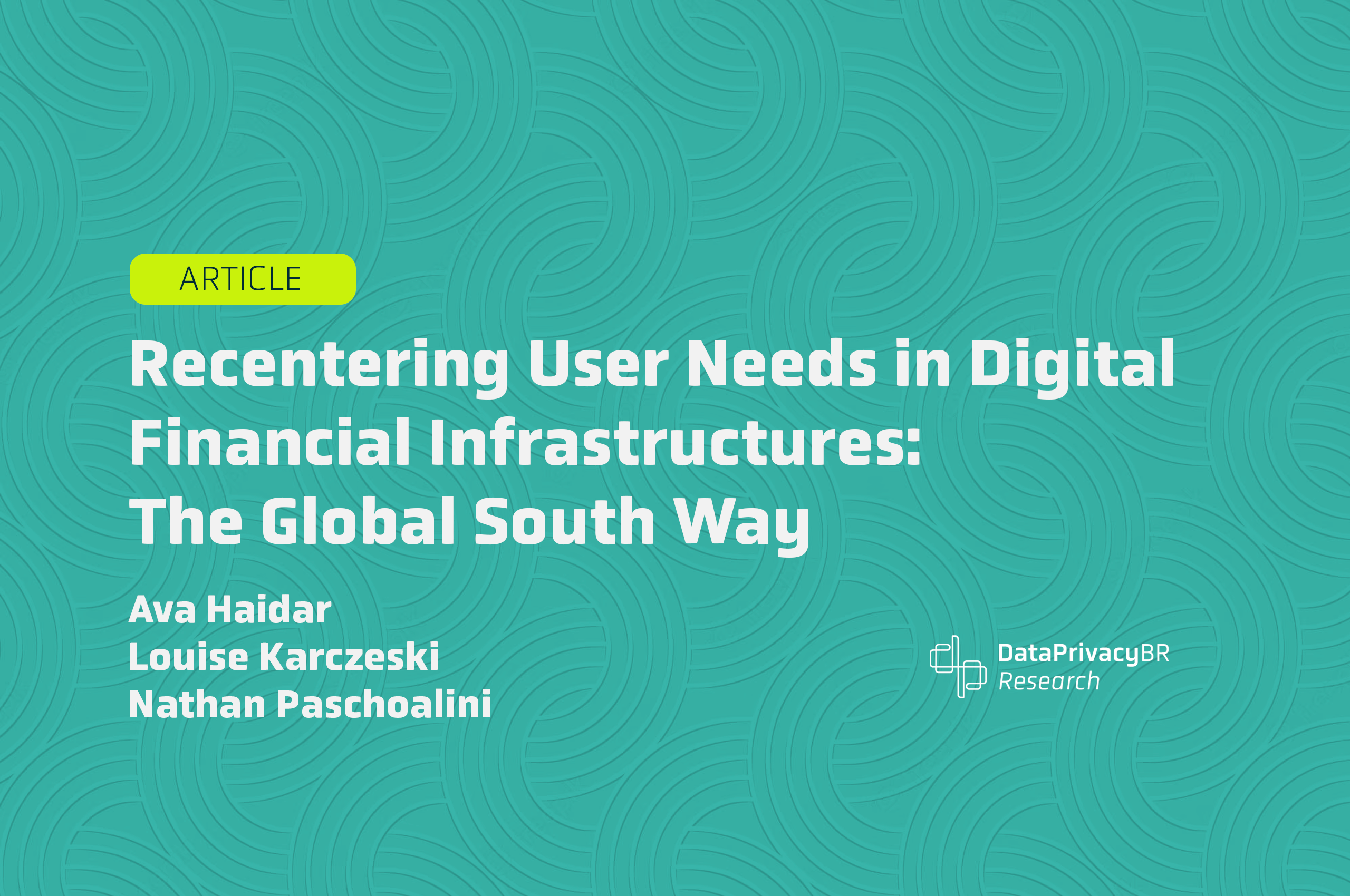Recentering User Needs in Digital Financial Infrastructures: The Global South Way
Through India’s G20 leadership in 2023, global agendas of digital transformation and financial growth have come to be intimately reoriented to challenges, priorities and special developments in the Global South.
By Ava Haidar
[1] [1] Senior Research Associate, Aapti Institute, Louise Karczeski
[2] [2] Anthropologist and researcher in the field of Governance and Regulation at Data Privacy Brasiland Nathan Paschoalini
[3] [3] Bachelor in Laws and researcher in the field of Governance and Reguation at Data Privacy Brasil
CONTEXT OF G20 AND NEW LEADERSHIP
Through India’s G20 leadership in 2023, global agendas of digital transformation and financial growth have come to be intimately reoriented to challenges, priorities and special developments in the Global South. The deployment of these agendas through Digital Public Infrastructure (DPI) in particular have been given centre-stage, symbolising a new order of digital payments, open data systems and identity-verification technologies for developing around a digital citizenry. These technologies in incumbent (India) and incoming (Brazil) G20 leadership find particular resonance in their financial digital public infrastructures.
EXAMINING THE COMMON GROUND: DIGITAL PUBLIC PAYMENT INFRASTRUCTURE
With high adoption of robust payment infrastructures such as UPI and PIX, citizens in India and Brazil are becoming increasingly digital in their economic and financial dealings. Over 330 million Indians are registered on UPI after 7 years of operation, while PIX is utilised by over 140 million users in Brazil after 3 years of its creation.
‘Interoperable’, ‘low-cost’, ‘convenient’ and ‘safe’ comprise the character of both these infrastructures, setting down a rhythm for digital financial payment principles of the Global South. At roughly 25% and 65% of their total country’s population respectively, these numbers represent sizeable growth in a few years time, making India and Brazil success stories in driving digital financial participation.
However, even with growing adoption and large-scale intention of these DPIs, the full realisation of a digital economy in these countries (and of other Global South territories) is impeded by challenges of affordability, literacy and socio-cultural factors. This calls into question not just the principles of the technology, but also how those principles translate on the ground. Considering the G20 as a key space for Global South engagement, this piece approaches digital financial infrastructures with a special focus on important aspects of the users’ experiences that could be considered for a Global South position and in the development of the G20’s digital strategy going forward.
ACCESS REMAINS A SOCIAL MONOLITH
PIX is a testament to the popularity of demand around practicality, interoperability, agility and low-cost operation. However, trailing issues of connectivity and prevailing divides signal a closer look into the issues that translate into the history of the last mile’s adoption. Interestingly, even though internet access was publicly deployed as early as 1988, today there remains differential access due to uneven population distribution and economic differences. Additionally, the white population of Brazil avails at least 10% more access than black, multi-racial and other demographic groups. These differences point to the history of socio-economic and implementational exclusion that prevent particular groups from using DPIs meaningfully, more so after the destabilising impact of the pandemic. Older age groups and rural populations also have less access to the digital ecosystem, entrenching digital divides further.
India faces similar challenges in digital access itself; the country accounts for “half of the world’s gendered digital divide.” Women comprise only a third of all Indian users on the internet, and even though a sizable number have access to it, their usage is shared, monitored or heavily prohibited by their socio-cultural norms. For instance, women’s free usage of phones is seen as immoral, or distracting, to their roles as mothers and wives. Thus, even when women are able to independently afford devices, they must hide their usage, or mask their movements through fake names online.
In both countries, access to digital excludes large portions of already-marginalised communities from reaching digital financial progress in as meaningful a way that their citizen counterparts do. The obstacles to access are not just physical, but also rooted in cultural norms, historical social inequalities and geography, thus solidifying the financial inequalities that exist between dominant groups and minorities. Literacy and comfort are also factors that determine the line between passive and active forms of access to the interface of platforms itself.
SAFETY AND ACCOUNTABILITY REQUIRE MORE USER-LED APPROACHES
Given the size of participation and scale of data around large infrastructures like PIX and UPI, there are similarly greater risks and vulnerabilities around people’s financial information and mobility. In the Brazilian context, the use of Pix has raised concerns on data protection; five cases of leaks of the users’ data have been registered since its launch. Additionally, the infrastructure has been used to carry out financial scams and fraud, either by exploiting system vulnerabilities or through social engineering techniques, or sometimes a combination of both. In 2023, almost six thousand people were victims of one of the modalities of scams that use Pix, which uses a smartphone malware called Brats that enables the use of the automated transfer system (ATS). The victims of these schemes are usually vulnerable groups, such as the elderly, exacerbating the access challenges to digital inclusion. Similarly, in India, over 95000 cases of “UPI fraud” were registered in the previous year, where scammers posed as official authorities threatening suspension of their services, or fraudulent QR Codes/ UPI links are used to trick people into paying.
Given a brief understanding of the current safety challenges in availing these DPIs, there are two broad areas of intervention: the first is accountability and protection, where people must not just have access to grievance redressal mechanisms in times of violation, but also transparency around digital infrastructures and harms around their usage. The centralisation of data in DPIs, while useful at a large level of analysis and deployment, possibly induces a vulnerability and threat to digital sovereignty. The second is people’s feeling of comfort and trust on DPIs; with lower levels of awareness and literacy, new users are more easily duped and taken advantage of on DPI platforms. This deters people who are opting into digital service perhaps for the first time, and who are otherwise also less digitally connected and conversant, expanding the access differences and digital divide earlier mentioned. As finance constitutes an important part of people’s wellbeing, experiencing harms creates distrust and a general discomfort around using digital services for essential needs, which must be treated with caution for the integration of citizens into DPIs.
Hence, actualising the “public” in DPIs thus requires a stronger focus on aligning principles of creation, deployment and maintenance in technology in ways that account for the majority needs. What we observe in experiments of the Global South is the need to recenter the user’s socio-economic profile and feelings of trust and safety in DPI creation.
BUILDING THE PATH TO INCLUSIVE FINANCIAL DPIS
Despite the challenges and concerns, the implementation of a financial digital public infrastructure, such as PIX and UPI, can serve the purpose of including people who are physically and otherwise excluded from the financial system. In this sense, as we project an inclusive future for the use of financial systems, and DPIs in general, the aforementioned problems must be taken into account so that the development of digital public financial infrastructures is guided by values that speak to the contemporary user’s needs.
As the benefits of affordability and low-cost often don’t account for socially “inclusive” approaches, stakeholders must consider who is continued to be excluded from this infrastructure, and further embed measures to ensure they do not fall through the cracks of financial digitalisation. Be it through more awareness or social safeguards, people’s access to DPIs must be addressed outside of variables like cost.
People’s adoption is also centred around their willingness – user faith is a key element for the seamless functioning of institutions; when it comes to financial digital public infrastructure, user expectations around security standards must be met in explicit ways to guarantee the financial integrity of the user. It is important to identify the silent assets of trust, vulnerability and comfort around a population’s digital usage, which can help design incentives and desires around adoption of DPIs, ultimately leading to greater inclusion and application.
Thus, foregrounding principles that might help guide stakeholders towards an affordable and inclusive financial future must focus on recentering the user through the following interventions:
- Responsibility: While transparency is a key part of engaging with any digital service, it is important that the governance of the digital financial infrastructure ties its responsibility to users through active transparency processes for its activities; this includes openness on risks with engagement, security breaches surrounding these systems and appropriate frictions (such as passwords and verifications) around people’s usage.
- Accessibility and Affordability: Accessibility must go beyond the usability conversation to the infrastructural needs of a population – it must account for lack of access to Internet and phones, or solve these issues through other innovations. For instance, the Central Bank of Brazil plans to tackle the connectivity issue by enabling offline transactions via Pix in the near future, paving the way for other financial inclusion policies. India’s UPI has this in place through UPI Lite X, allowing offline sending and receiving of money in remote locations through a simple dialing function.
- Trust and Protection: Infrastructures must be reliable and inspire the user’s trust, not just through honest and responsible design, but also through recognition of the harms that people are exposed to when they place their personal details in the technology. Financial security measures must work to ensure that people who are targeted by scams using tools such as Pix and UPI are not financially harmed.
- User-centric Design: Systems must be designed in a way that the user’s need and expectations come first – this includes a commitment to the baseline of usability. Infrastructures like UPI and PIX require only QR Code-literacy, that is, a “digital language [that] can be developed for a verbal community”, accounting for a wider range of user ability than even simple digital text and iconography can. There must additionally be greater focus on populations that are generally left out of these infrastructures and scoping their visual and digital needs in design.
Veja também
-
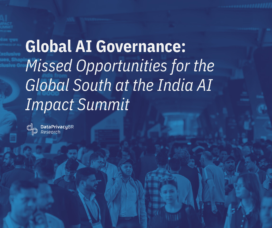
Global AI Governance: Missed Opportunities for the Global South at the India AI Impact Summit
The India AI Impact Summit generated significant expectations, particularly because it was the first edition hosted in the Global South. India’s leadership created hope that the Summit could reposition global AI governance debates by centering the priorities of developing countries, strengthening South-South coordination, and advancing greater alignment with ongoing multilateral initiatives. However, by the conclusion of the Summit, many of these expectations had not been fulfilled.
-
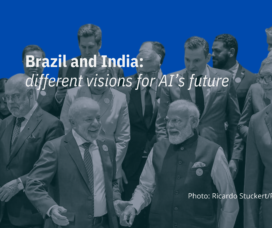
AI Summit: Brazil and India on different moves?
One of the most notable dynamics in the opening days of the AI Impact Summit (February 16–19) has been the contrast between the address delivered by Brazil’s President, Luiz Inácio Lula da Silva, and the posture adopted by India’s Prime Minister, Narendra Modi, regarding the future of global AI governance.
-
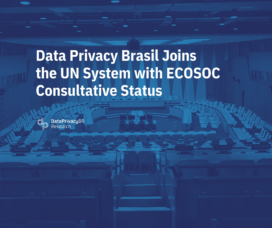
Data Privacy Brasil Joins the UN System with ECOSOC Consultative Status
Data Privacy Brasil has a strong track record of engagement in international processes, including those within the United Nations system. Now, in 2026, it officially becomes part of this system: we are an organization with consultative status with ECOSOC.
-
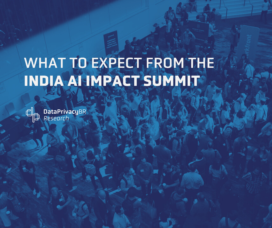
What to expect from the India AI Impact Summit
During the week of February 16–20, Data Privacy Brasil will participate in the India AI Impact Summit in New Delhi. This is yet another “AI Summit,” an event now in its fourth edition, which each year is hosted by a different country and shaped by a unique framework. It is an opportunity for each host country to place its own agenda and priorities in the spotlight within the highly contested field of global artificial intelligence governance.
-
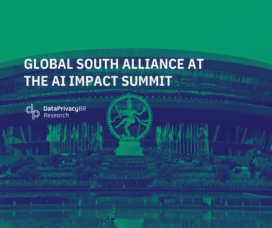
Global South Alliance at the AI Impact Summit
In February 2026, New Delhi will host the AI Impact Summit, one of the leading global forums on artificial intelligence governance. Organized by the Indian government, the Summit builds on earlier high-level initiatives such as the AI Safety Summit (Bletchley Park, 2023), the AI Seoul Summit (2024), and the AI Action Summit (Paris, 2025). Although […]
-
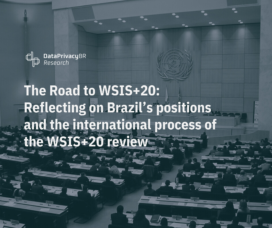
The Road to WSIS+20: Reflecting on Brazil’s positions and the international process of the WSIS+20 review
During 2025, Data Privacy Brasil engaged in an important process of the United Nations for global digital governance: the 20-year review of the World Summit on Information Society (WSIS). The first part of this engagement was translated into the report The Road to WSIS+20: Key Country Perspectives in the Twenty-Year Review of the World Summit on the Information Society, coordinated by Global Partners Digital and Global Network Initiative. Our team followed the Brazilian engagement through the process, also contributing with government delegates and other stakeholders.
-

Centering human rights in the design and adoption of DPIs: Perspectives on DPI design, adoption and implementation
Members of the Global South Alliance joined the Global Digital Public Infrastructure (DPI) Summit, convened from November 4 to 6, 2025, at the Cape Town International Convention Centre in South Africa. The theme of the event was “Digital Public Infrastructure in Practice: Implementing Tomorrow’s Digital Society Today.” The summit was co-hosted by the World Bank […]
-

The Global DPI Summit: reframing the debate from a Global South perspective
This November, the Global DPI Summit will bring together powerful actors to champion Digital Public Infrastructure (DPI) as an opportunity for development, which demands critical thinking and not only a promotional approach. Organized by Co-Develop, the International Telecommunication Union (ITU), the United Nations Development Programme (UNDP), the UN Office of Digital and Emerging Technologies, and […]
Veja Também
-

Global AI Governance: Missed Opportunities for the Global South at the India AI Impact Summit
The India AI Impact Summit generated significant expectations, particularly because it was the first edition hosted in the Global South. India’s leadership created hope that the Summit could reposition global AI governance debates by centering the priorities of developing countries, strengthening South-South coordination, and advancing greater alignment with ongoing multilateral initiatives. However, by the conclusion of the Summit, many of these expectations had not been fulfilled.
-

Data Privacy Brasil Joins the UN System with ECOSOC Consultative Status
Data Privacy Brasil has a strong track record of engagement in international processes, including those within the United Nations system. Now, in 2026, it officially becomes part of this system: we are an organization with consultative status with ECOSOC.
-

What to expect from the India AI Impact Summit
During the week of February 16–20, Data Privacy Brasil will participate in the India AI Impact Summit in New Delhi. This is yet another “AI Summit,” an event now in its fourth edition, which each year is hosted by a different country and shaped by a unique framework. It is an opportunity for each host country to place its own agenda and priorities in the spotlight within the highly contested field of global artificial intelligence governance.
-

Global South Alliance at the AI Impact Summit
In February 2026, New Delhi will host the AI Impact Summit, one of the leading global forums on artificial intelligence governance. Organized by the Indian government, the Summit builds on earlier high-level initiatives such as the AI Safety Summit (Bletchley Park, 2023), the AI Seoul Summit (2024), and the AI Action Summit (Paris, 2025). Although […]
-

The Road to WSIS+20: Reflecting on Brazil’s positions and the international process of the WSIS+20 review
During 2025, Data Privacy Brasil engaged in an important process of the United Nations for global digital governance: the 20-year review of the World Summit on Information Society (WSIS). The first part of this engagement was translated into the report The Road to WSIS+20: Key Country Perspectives in the Twenty-Year Review of the World Summit on the Information Society, coordinated by Global Partners Digital and Global Network Initiative. Our team followed the Brazilian engagement through the process, also contributing with government delegates and other stakeholders.
-

Centering human rights in the design and adoption of DPIs: Perspectives on DPI design, adoption and implementation
Members of the Global South Alliance joined the Global Digital Public Infrastructure (DPI) Summit, convened from November 4 to 6, 2025, at the Cape Town International Convention Centre in South Africa. The theme of the event was “Digital Public Infrastructure in Practice: Implementing Tomorrow’s Digital Society Today.” The summit was co-hosted by the World Bank […]
-

The Global DPI Summit: reframing the debate from a Global South perspective
This November, the Global DPI Summit will bring together powerful actors to champion Digital Public Infrastructure (DPI) as an opportunity for development, which demands critical thinking and not only a promotional approach. Organized by Co-Develop, the International Telecommunication Union (ITU), the United Nations Development Programme (UNDP), the UN Office of Digital and Emerging Technologies, and […]
-
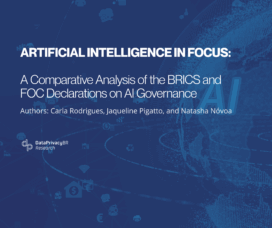
Artificial Intelligence in Focus: A Comparative Analysis of the BRICS and FOC Declarations on AI Governance
The BRICS Leaders' Declaration on Global Governance of Artificial Intelligence has gained prominence in both Brazilian and international media, as it represents a joint position by Global South countries in the ongoing contest over this emerging technology.
-
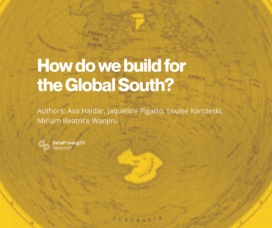
How do we build for the Global South?
We live in a world of digital divides. The Global South represents 88 percent of the world’s population and has a higher number of internet users, yet it remains under-served by digital technology. Check out the full article on our website.
-
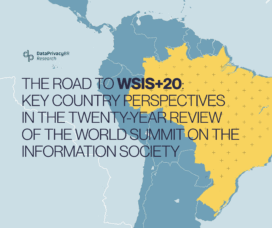
The Road to WSIS+20: Key Country Perspectives in the Twenty-Year Review of the World Summit on the Information Society
This report aims to support engagement in the WSIS+20 process by providing insight into the positions and priorities of selected governments.
-
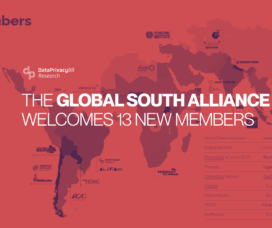
The Global South Alliance welcomes 13 new members
The Global South Alliance is a coalition formed in 2022 with the mission of unifying NGOs dedicated to the promotion of mutual learning and the advancement of digital rights with a perspective from the Global South. In May, the Global South Alliance welcomed 13 new members, reaching the total number of 26 organisations.
-

Job Opening: Digital Librarian
The Data Privacy Brasil makes the notice public with registrations until July 11th.
-
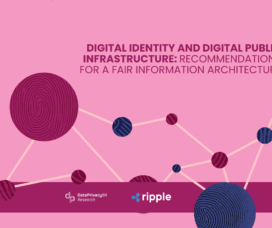
Report | Digital Identity and Digital Public Infrastructure: recommendations for a fair information architecture
Data Privacy Brasil launches its new report entitled “Digital Identity and Digital Public Infrastructure: recommendations for a fair information architecture”. The study examines the impact of a Digital Public Infrastructure (DPI), especially digital identity applications, on the protection of personal data in light of the Brazilian Federal Constitution (CF) and the General Data Protection Law (LGPD).
-

Five-Point Plan for an Inclusive WSIS+20 Review
As stakeholders engaged in the WSIS+20 Review process, organizations sign the petition presenting recommendations to help operationalize the WSIS+20 review modalities in order to ensure transparency, inclusion, and meaningful stakeholder engagement.
-
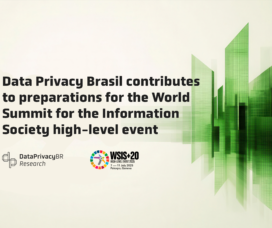
Data Privacy Brasil contributes to preparations for the World Summit for the Information Society high-level event
The event, which is co-organized by the ITU, UNESCO, UNDP, and UNCTAD, takes place in July, and this March, stakeholders were able to send their suggestions regarding the format and content to be debated, especially in light of the review process.
-
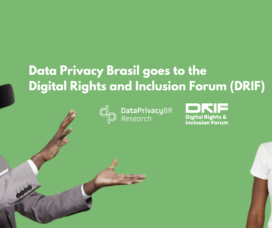
Data Privacy Brasil goes to the Digital Rights and Inclusion Forum (DRIF)
For the third consecutive year, Data Privacy Brasil will participate in the Digital Rights and Inclusion Forum (DRIF). DRIF – formerly known as the Internet Freedom Forum (IFF) – is an annual forum organized by Paradigm Initiative (PIN), since 2013, to be a space for discussions on global issues related to digital rights and inclusion.
-
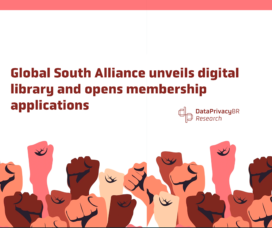
Global South Alliance unveils digital library and opens membership applications
The GSA invites organizations to express their interest in joining the network by completing the application form available until April 24.
-
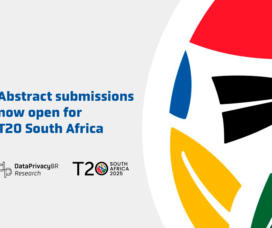
Abstract submissions now open for T20 South Africa
The Think20 South Africa invites researchers from around the world to contribute to a dynamic exchange of ideas on today's most pertinent challenges. The deadline for submitting abstracts is February 10, 2025.
-
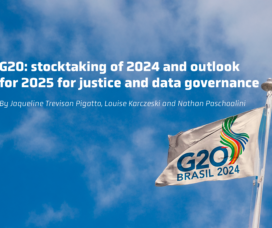
G20: stocktaking of 2024 and outlook for 2025 for justice and data governance
In 2024, Data Privacy Brasil took on a new and exciting challenge: participating in the G20 ecosystem, during the Brazilian presidency, through the official engagement group for think tanks, Think 20 (T20). Check out the text to learn more about Data's work at the G20.
-
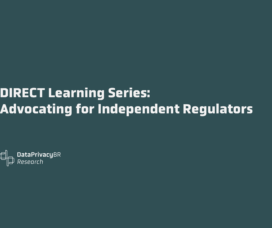
DIRECT Learning Series: Advocating for Independent Regulators
The 6th workshop took place on November 6th, 2024, in the context of the Data Rights and Enforcement through Community Trust (DIRECT) Learning Series, an ongoing thematic series of workshops with members of the DIRECT consortium, supported by Internews.
-

Exploring Opportunities in the Digital Economy and AI at the G20
The task force 5 of T20 Brasil has engaged several international think tanks to provide ideas and policy proposals on crucial areas of technological development, such as AI and Digital Public Infrastructures. This includes encouraging G20 nations to adopt policies that protect individual rights while fostering innovation.
-

DIRECT Learning Series: data protection training and capacity building
The 5th workshop took place on October 2nd, 2024, in the context of the Data Rights and Enforcement through Community Trust (DIRECT) Learning Series, an ongoing thematic series of workshops with members of the DIRECT consortium, supported by Internews.
-
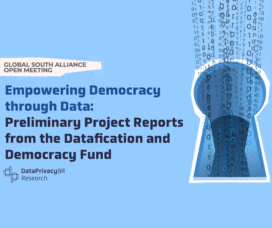
Empowering Democracy through Data: preliminary project reports from the DDF
The Global South Alliance wil host its next open meeting on October 22, 2024, where grantees from the first cohort of the Datafication and Democracy Fund (DDF) will present their impactful research.
-

Protean acknowledged for leadership in digital public infrastructure
A report from Data Privacy Brasil underscores how DPI can be leveraged to create environments where data privacy and security are prioritized.
-
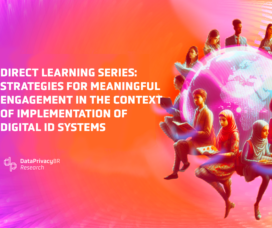
DIRECT Learning Series: strategies for meaningful engagement in the context of implementation of Digital ID systems
This workshop took place on August 28th, 2024, in the context of the Data Rights and Enforcement through Community Trust (DIRECT) Learning Series, an ongoing thematic series of workshops with members of the DIRECT consortium, supported by Internews.
-
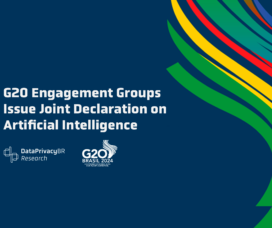
G20 Engagement Groups Issue Joint Declaration on Artificial Intelligence
On Tuesday (10), the main G20 engagement groups, including Civil 20 (C20), Labor 20 (L20), Think 20 (T20) and Women 20 (W20), announced a groundbreaking joint statement on the ethical, sustainable and inclusive development and deployment of artificial intelligence (AI).
-
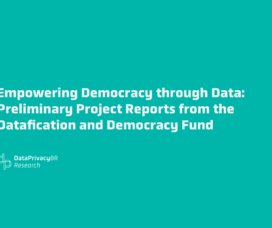
Empowering Democracy through Data: Preliminary Project Reports from the Datafication and Democracy Fund
The Global South Alliance held its first meeting with the organizations covered by the Datafication and Democracy Fund. On the occasion, each of the five organizations - Like a Palm Tree (Africa), Center of Security and Citizenship Studies (LatAm), Corporación Cambio Sostenible (LatAm), Criminal Justice & Policy Accountability Project (India), and Ikigai Innovation Initiative (Africa) - had the opportunity to present the preliminary results of their projects and hear feedbacks from the GSA members.
-
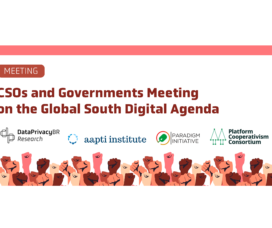
CSOs and Governments Meeting on the Global South Digital Agenda
On September 21st and 24th, the event “Open Dialogue: Global South Alliance and Governments for an Inclusive Digital Agenda” will take place, promoted by the organizations Data Privacy Brasil, Aapti Institute, Paradigm Initiative and PCC (The New School). The event aims to provide an open conversation with diplomats about the international agenda for IPRs, AI, GDC implementation and G20 continuity.
-
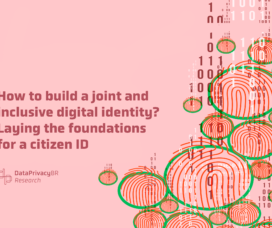
How to build a joint and inclusive digital identity? Laying the foundations for a citizen ID
Do you know what an identity is? Thinking about facilitating access to the topic, Data Privacy Brasil has developed a series of content to provide the foundations and tools possible for all the details on the subject. With this, we will be able to discuss, as a community, what we want with a digital identity and how we can achieve it.
-
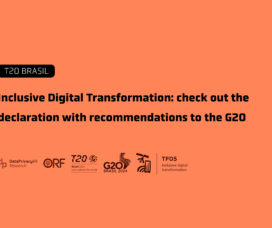
Inclusive Digital Transformation: check out the declaration with recommendations to the G20
In the document, six priorities were defined to deal with issues such as digital inclusion and meaningful universal connectivity; and challenges, opportunities and governance of artificial intelligence.
-
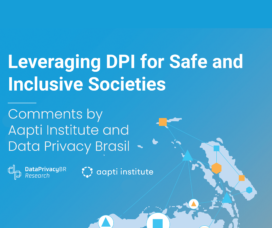
Leveraging DPI for Safe and Inclusive Societies
Aapti and Data Privacy Brasil have submitted their contribution to the Office of the United Nations Secretary-General's Envoy on Technology (OSET) and the United Nations Development Programme (UNDP) regarding the report "Leveraging DPI for Safe and Inclusive Societies".
-
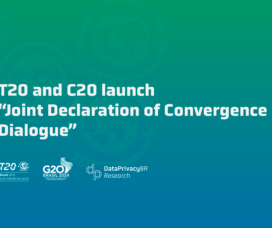
T20 and C20 launch “Joint Declaration of Convergence Dialogue”
On the 2nd and 3rd of July, a Mid-Term Conference took place in Rio de Janeiro, a T20 event with the participation of leaders from national and international think tanks, members of academia, representatives of the private and public sectors and civil society to discuss and propose solutions to the main global challenges.
-

Datafication and Democracy Fund welcomes five organizations from the Global South for short-term projects
The Datafication and Democracy Fund Committee, composed of Data Privacy Brasil, Paradigm Initiative, and Aapti Institute, is pleased to announce the five organizations awarded funding for a short-term research project.
-
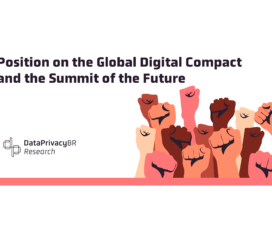
Position on the Global Digital Compact and the Summit of the Future
Between the 9th and 10th of May, the UN Civil Society Conference is happening in Nairobi. The event is presented as an opportunity to engage civil society in preliminary discussions ahead of the Summit of the Future.
-
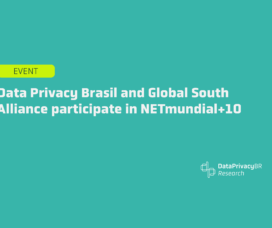
Data Privacy Brasil and Global South Alliance participate in NETmundial+10
Between April 29th and 30th, the NETmundial+10 took place in São Paulo. Building upon the event and the NETmundial Declaration of 2014, this event focused on strengthening global multistakeholder governance for the Internet and digital technologies, as well as conveying messages to global actors for better coordination of various ongoing processes.
-
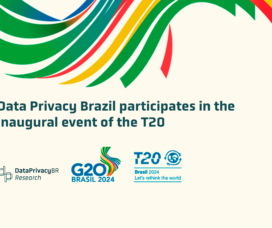
Data Privacy Brazil participates in the inaugural event of the T20
Between March 4th and 6th, the Organizing Committee of T20 Brazil - composed of CEBRI, FUNAG, and IPEA - held the first official event of the engagement group. The event took place entirely virtually and was openly broadcast to the public.
-

Inclusive Digital Transformation in the T20
The year 2024 marks Brazil's presidency in the G20, the group of the world's largest economies, chaired by our country for the first time. It is a year of great opportunity for Brazil to influence a broad global governance agenda, prioritizing issues such as inequality, climate change, and, of course, digital transformations.
-
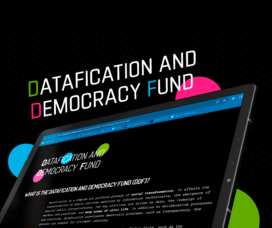
Data Privacy Brasil, Paradigm Initiative and Aapti Institute announce the launch of the “Datafication and Democracy Fund”
The fund aims to finance activities that strengthen the work of NGOs in the Global South on issues of datafication and democracy
-

At UNCTAD eWeek, Data Privacy Brasil will discuss the intersection between digital economy and human rights in AI regulation
The UNCTAD eWeek, an initiative of the United Nations Conference on Trade and Development (UNCTAD) in partnership with eTrade for all, will occur from the 4th until the 8th of December.
-
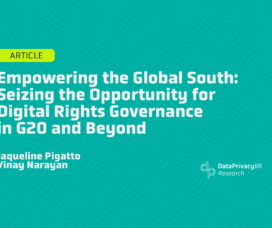
Empowering the Global South: Seizing the Opportunity for Digital Rights Governance in G20 and Beyond
The G20 represents a critical policy space for addressing emergent challenges on a global scale and its importance as a platform is pronounced when we consider its significance for the Global South.
-
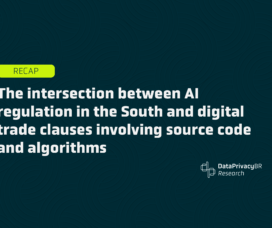
The intersection between AI regulation in the South and digital trade clauses involving source code and algorithms
Recap of Session 43 of the WTO’s 2023 Public Forum organized by Data Privacy Brasil and REBRIP
-
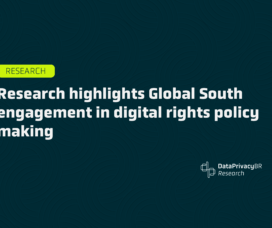
Research highlights Global South engagement in digital rights policy making
The Data Privacy Brasil Research Association announces the launch of the research report on Global South perspectives on international engagement in digital rights.
-
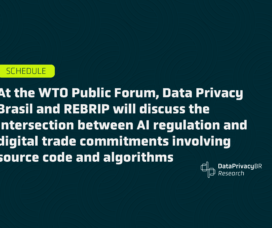
At the WTO Public Forum, Data Privacy Brasil and REBRIP will discuss the intersection between AI regulation and digital trade commitments involving source code and algorithms.
The WTO Public Forum 2023 will take place between September 12th and 15th in Geneva.
-

Data Privacy Brasil’s contribution to the Thematic Deep Dive of Artificial Intelligence and other Emerging Technologies of the Global Digital Compact
As other civil society organizations already pointed out, notable preference was given to the speech of Member States, UN agencies, and the private sector, at the expense of human rights civil society organizations, which prevented the speech that had been prepared by the DBPR and other civil society stakeholders.
-
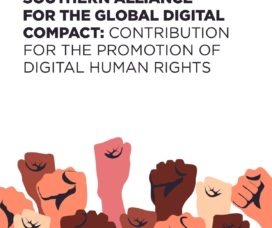
Southern Alliance for the Global Digital Compact
Responding to the call made by the United Nations, the Data Privacy Brazil Research Association, together with organizations from the Global South, presents a contribution to the Global Digital Compact.
-

Data Privacy Brasil Research Association contributes to UN open call on the relationship between human rights and technical standard-setting processes
We received a call as an opportunity to submit suggestions to inform the OHCHR report on the relationship between human rights and standard-setting processes for new and emerging digital technologies.
-
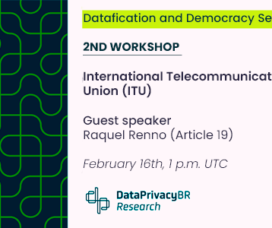
Our second workshop of a series about technical forum talks about the International Telecommunications Union
In the second meeting of the Datafication and Democracy Workshop Series, we received Raquel Renno, Digital Programme Officer of Article 19, who spoke about the International Telecommunication Union (ITU) for third sector organizations.
-
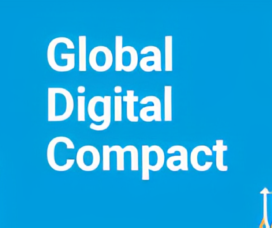
Let’s stay tuned for the Global Digital Compact
What is the Global Digital Compact and why is it important to keep an eye on it?
-

Why should we all pay attention to the Brazilian Digital ID system?
The implementation of digital identity systems is increasing around the world, especially in Global Southern countries. The model widely adopted is known as Big ID, promoted by or linked to public administration bodies which use centralized biometric databases to identify and authenticate citizens (Access Now, 2021).
DataPrivacyBr Research | Content under licensing CC BY-SA 4.0

